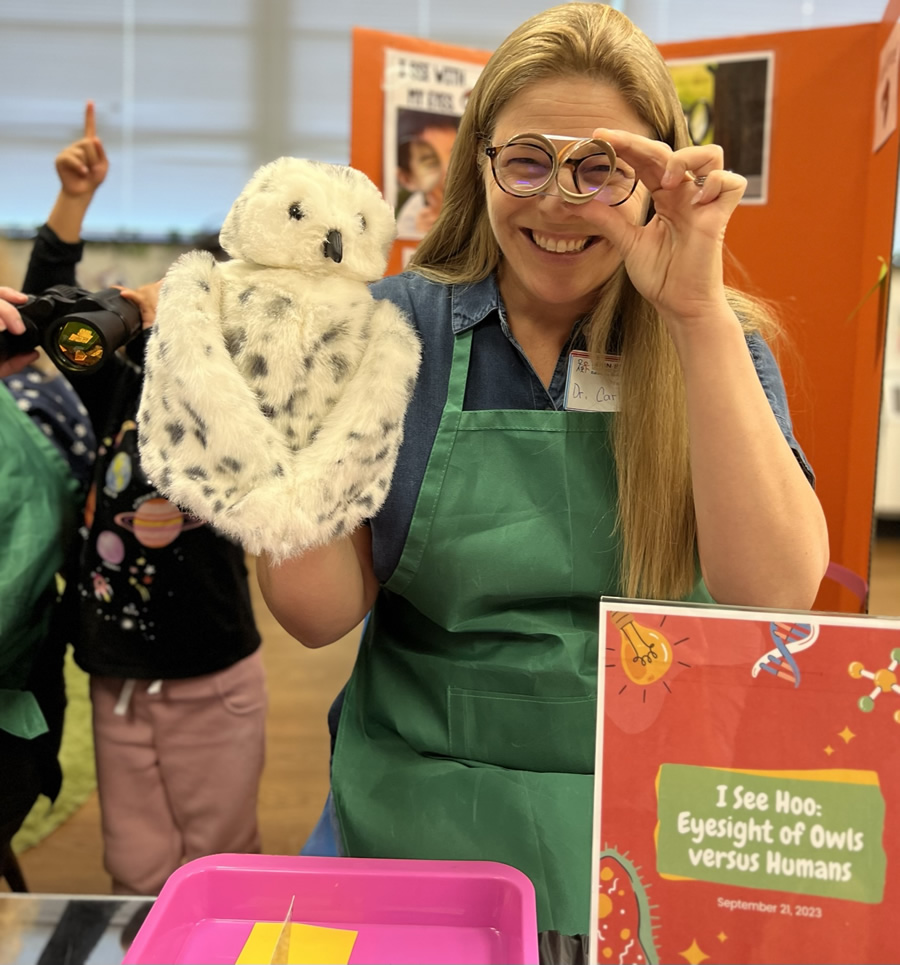
Children are natural scientists. They are curious, love to explore, and ask a lot of questions. Kids need opportunities to develop the skills they need to think like a scientist which will allow them to understand increasingly complex science concepts. They also need to have positive experiences to foster positive dispositions toward science (i.e., not think it is scary or boring). Making science fun is easy! Here are some tips from 10 Tips to Support Children’s Science Learning:
Explore and find the answers together.
Sometimes we don’t know the answers to children’s questions. It’s okay to say “I don’t know. Let’s find out together.” Try to resist just Googling it and that’s the end. Talk about different ways you might find the answers, including multiple resources and further investigation/observation.
Give children time and space to explore.
Children learn through repetition and trial and error. When my class leads Family Science Nights at the Child Development Center, we have to practice patience and asking open-ended questions. We don’t want to jump in and give the correct answer, which ends the child’s exploration.
Accept that explorations are often messy.
Whether making Oobleck in the classroom or digging for worms outside, we accept that learning experientially is messy. It helps to go into learning with this expectation (i.e., dress appropriately, bring along some wipes). Student anxiety over getting dirty, or their parents' reaction to them getting dirty, can often stifle the learning process.
Learn from mistakes together.
It’s important to model for your students how to react when you make a mistake. When I try an experiment in class that goes terribly wrong, I don’t try to cover it up. I talk my students through the thought process of what went wrong and how I might try again using a different approach. Sometimes the mistake even takes us in new exciting directions. This models academic rigor and provides an example of how we don’t give up when we’re not right the first time. Too often our students mirror our own perfectionism. If they see that failure is normal and even their teacher experiences it, they will give themselves a little more grace.
Invite curiosity.
In our classrooms, we try to create an environment that welcomes curiosity. We create spaces, such as Wonder Walls, Wonder Tables, and Question Boxes, that encourage children to observe closely and ask their own questions. We also model by sharing our own wonderings, “I wonder whether a butterfly laid these eggs on this leaf?”
Support further exploration.
We have the opportunity to extend children’s learning intentionally. For example, if a child asks, “I wonder if the square-shaped bubble wand will make cube-shaped bubbles?” respond with, “Let’s try it and see what happens!”
Encourage children to record their observations.
Using our senses to observe is one of the most fundamental skills of being a scientist. We ask children to not only write down what they observe, but draw it. The act of drawing slows them down, gets them to look from a different vantage point, and notice new details.
Make good use of your electronic devices.
Don’t let the device take away the process of exploration. Instead, use it to enhance your exploration. Take pictures of different leaves, record sounds of different birds singing, use an app to help identify plants and animals you don’t recognize so you can learn more about them.
Use items you have at home to experiment and explore
Kitchen science is fun and accessible. Making a volcano erupt with vinegar and baking soda never gets old. Also, participating in a cooking activity, such as baking bread, is full of interesting science and math. I love to cook with students in the classroom. Whether it’s making soup from vegetables we grew in the school garden in a crock pot to making homemade apple sauce in an Instant Pot from apples we picked, peeled, and chopped following a field trip to a local orchard or farm.
This feature was written by Carley Fisher-Maltese, associate professor of Early Childhood Education. To learn more about our Early Childhood Education program, please visit our website.
